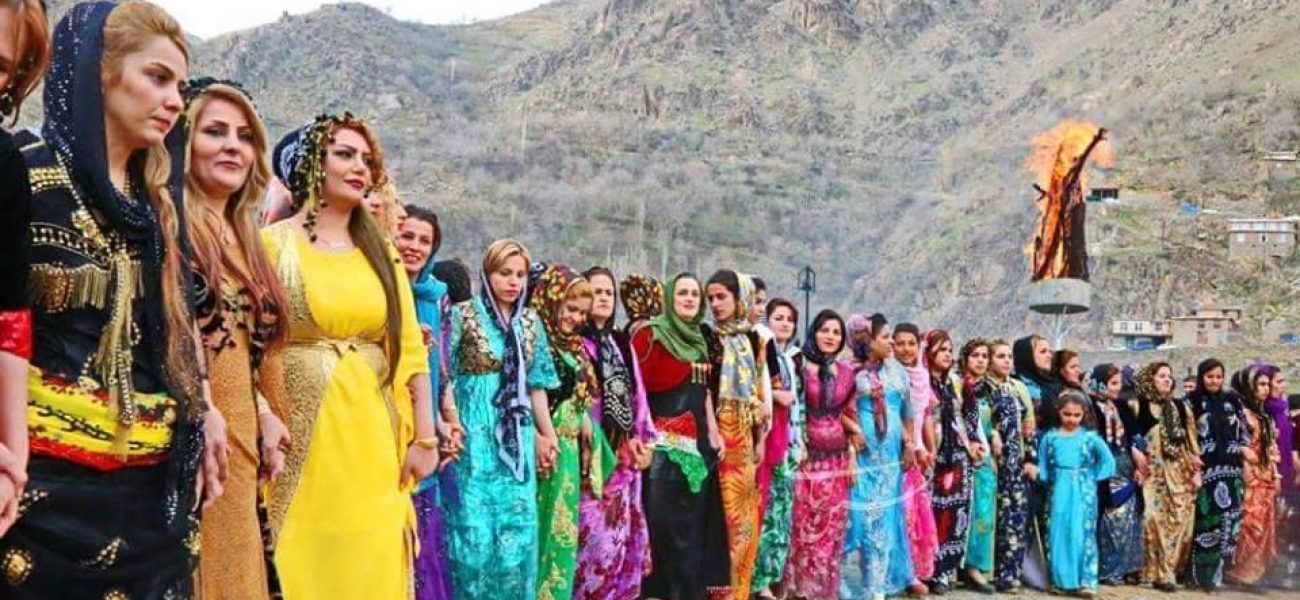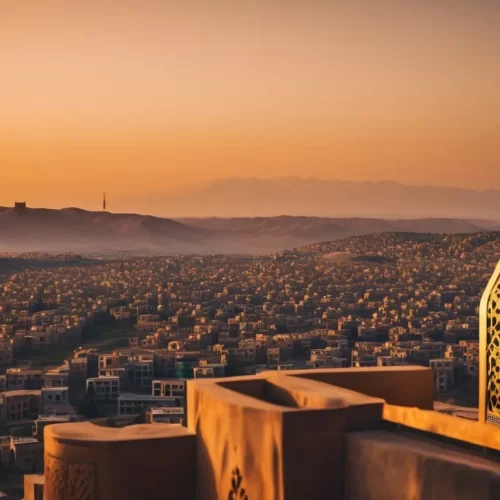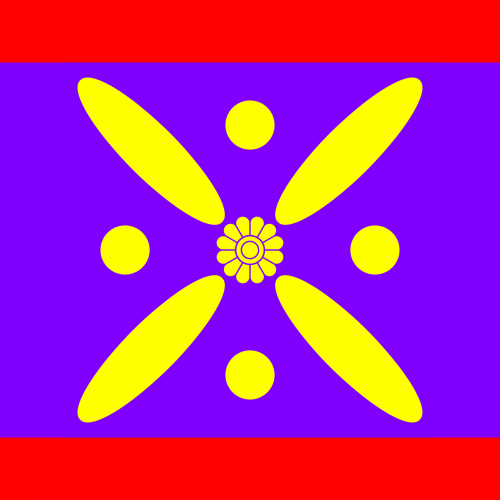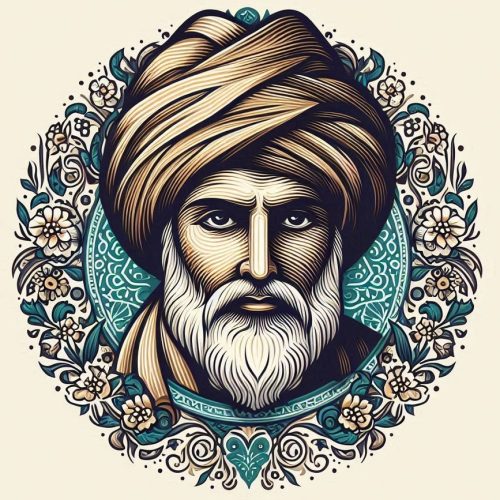Nestled in the mountainous landscapes of western Iran, the Kurds form a significant and dynamic minority with a rich cultural heritage. Comprising around 9 to 10 million people, the Kurdish population in Iran contributes to the country’s cultural tapestry with their unique traditions, language, and historical significance. This article delves into the multifaceted aspects of the Kurds in Iran, exploring their history, culture, socio-economic dynamics, and the challenges they face in the contemporary landscape.
Historical Overview
Ancient Roots
The history of the Kurds can be traced back to ancient times, finding its roots intertwined with the Medes, an ancient Iranian people mentioned in historical texts. The ancient Medes, known for their significant contributions to the early development of Iranian civilization, played a crucial role in shaping the cultural and ethnic landscape of the region. As centuries passed, the distinct identity of the Kurdish people began to crystallize, influenced by the diverse historical, cultural, and linguistic elements present in the region.
The Safavid Era
The Safavid era marks a significant chapter in the history of the Kurds, as their territories became part of the sprawling Persian Empire. During this period (1501–1736), the Safavid rulers sought to consolidate their empire, incorporating various ethnic groups, including the Kurds, into the administrative and socio-political structures. While the integration brought the Kurds into the larger Persian cultural orbit, it also laid the foundation for complex relationships and occasional tensions with the central government.
Modern Era: Shaping Identity
The modern era witnessed the emergence of nation-states, redefining the dynamics of identity and autonomy for the Kurds. As geopolitical boundaries were drawn, Kurdish populations found themselves divided among several countries, including Iran. The struggle for autonomy and recognition gained momentum, shaping the modern Kurdish identity. The Kurds in Iran, along with their counterparts in neighboring countries, became integral actors in the unfolding narrative of statehood, identity, and regional politics.
The Kurdish Struggle
The 20th century brought both challenges and opportunities for the Kurds in Iran. The struggle for recognition and autonomy intensified, marked by various uprisings and movements seeking to assert Kurdish rights. The Pahlavi era (1925–1979) witnessed periodic clashes between the central government and Kurdish groups advocating for greater autonomy and cultural rights. The complex interplay of geopolitical forces and internal dynamics continued to shape the Kurdish experience within the borders of Iran.
Contemporary Geopolitics
The late 20th and early 21st centuries have seen the Kurds navigating complex geopolitical landscapes. The Iranian government, while recognizing the Kurds as an ethnic group, has faced challenges in addressing their demands for cultural rights and autonomy. The broader regional dynamics, including the Kurdish situations in Iraq, Turkey, and Syria, further influence the political calculus surrounding the Kurds in Iran.
Cultural Resilience
Throughout their history, the Kurds in Iran have demonstrated remarkable cultural resilience. Despite challenges posed by political changes and geopolitical realities, the Kurds have preserved and celebrated their unique traditions, language, and folklore. This cultural resilience is evident in various aspects of Kurdish life, from traditional music and dance to literature and religious practices.
Influence of Kurdish Diaspora
The Kurdish diaspora, dispersed across the globe due to historical and contemporary factors, plays a significant role in shaping the narrative of the Kurds in Iran. Diaspora communities actively engage in advocacy, cultural preservation, and international dialogue, fostering a global understanding of Kurdish identity and concerns.
Evolving Narratives
In the 21st century, the narratives surrounding the Kurds in Iran are evolving. Discussions on minority rights, political reforms, and cultural recognition are gaining prominence. International attention to the Kurdish cause, coupled with a shifting geopolitical landscape, has the potential to influence the trajectory of the Kurds in Iran, offering new possibilities for dialogue and understanding.
Cultural Identity

Language and Literature
The Kurdish language, belonging to the Northwestern Iranian branch of the Indo-Iranian languages, serves as a powerful emblem of Kurdish identity. Despite historical challenges to its usage, efforts to preserve and promote the language persist. Kurdish literature, with its rich oral traditions and written forms, becomes a repository of cultural heritage, transmitting stories, folklore, and the collective experiences of the Kurdish people across generations.
Language Revitalization Efforts
Contemporary initiatives focus on language revitalization, including educational programs, literary publications, and media efforts. While challenges remain, the commitment to preserving the Kurdish language reflects a deep-seated determination to pass on linguistic and cultural treasures to future generations.
Oral Tradition
The oral tradition, an integral part of Kurdish culture, contributes to the living tapestry of Kurdish identity. Through storytelling, poetry, and folk narratives, the Kurds maintain a dynamic connection with their history, values, and shared experiences.
Traditional Kurdish Music and Dance
Kurdish music and dance serve as vibrant expressions of cultural identity, transcending geographical and political boundaries. The sounds of traditional instruments, such as the daf, santur, and zurna, resonate through the hills and valleys of Kurdistan, providing a soundtrack to both daily life and celebratory occasions.
Regional Variations
Different regions within the Kurdish diaspora contribute their unique musical styles and dance forms, showcasing the diversity within the Kurdish community. From the lively and rhythmic dances of the northern Kurds to the more contemplative and symbolic movements of the southern Kurds, each variation adds layers to the cultural mosaic.
Role in Celebrations
Music and dance play a central role in Kurdish celebrations, including weddings, Newroz (Kurdish New Year), and religious festivals. These cultural expressions serve not only as forms of entertainment but also as means of preserving cultural narratives, connecting generations, and fostering a sense of community.
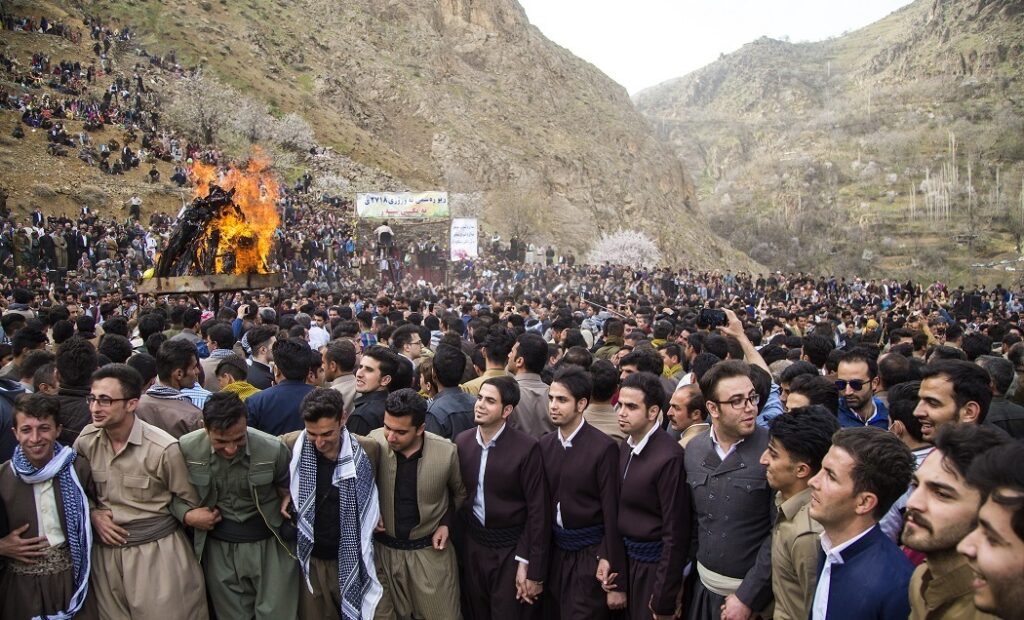
Religious Diversity
The Kurds in Iran, like their counterparts in other parts of Kurdistan, encompass a spectrum of religious affiliations. While the majority are Sunni Muslims, there are also communities of Shia Muslims, Yazidis, and Christians among the Kurds. This religious diversity contributes to the richness of the Kurdish cultural landscape, fostering an environment where various traditions coexist and influence one another.
Religious Practices
Religious practices within the Kurdish community encompass a range of rituals, ceremonies, and festivals. Whether celebrating Nowruz, participating in Sufi-inspired rituals, or observing religious events specific to their faith, the Kurds exhibit a tapestry of religious diversity that shapes their cultural identity.
Interfaith Dialogue
The coexistence of different religious communities among the Kurds has historically facilitated interfaith dialogue and mutual understanding. Despite external pressures and geopolitical complexities, this religious diversity remains a testament to the Kurds’ ability to navigate complex socio-religious landscapes.
Socio-Economic Dynamics
Cultural Preservation
Efforts to preserve Kurdish culture encompass various dimensions, with language policies, cultural events, and educational initiatives playing pivotal roles. Despite the challenges posed by linguistic restrictions and cultural suppression, the Kurds remain steadfast in their commitment to preserving and celebrating their cultural heritage.
Educational Initiatives
Recognizing the importance of education in cultural preservation, there is a growing emphasis on establishing educational initiatives that promote Kurdish language and history. Schools, cultural centers, and community-driven programs strive to create spaces where the younger generation can learn about and take pride in their cultural identity.
Cultural Festivals and Art
Cultural festivals and artistic expressions serve as vibrant mediums for cultural preservation. From traditional music festivals to art exhibitions showcasing Kurdish heritage, these events not only provide a platform for creative expression but also foster a sense of community pride and resilience against cultural erasure.
Women’s Role in Socio-Economic Dynamics
Examining the socio-economic dynamics of the Kurds in Iran is incomplete without acknowledging the crucial role of Kurdish women. Traditionally playing pivotal roles in both rural and urban settings, Kurdish women contribute significantly to the socio-economic fabric while navigating the challenges of gender-specific disparities.
Rural Women in Agriculture
In rural areas, Kurdish women actively participate in agriculture, contributing to the cultivation of crops and the management of livestock. Their roles extend beyond traditional gender norms, embodying resilience and resourcefulness as they balance agricultural responsibilities with household duties.
Urban Women in the Workforce
Urbanization has brought changes to the roles of Kurdish women, with increasing numbers entering the workforce and pursuing higher education. This shift not only reflects evolving societal norms but also presents opportunities for economic empowerment and greater participation in public life.

Community Development Initiatives
In response to economic challenges and disparities, community-driven development initiatives are gaining momentum within Kurdish regions. These initiatives aim to empower local communities, enhance infrastructure, and create sustainable economic opportunities.
Cooperative Ventures
Cooperative ventures and community-driven projects play a vital role in fostering economic self-sufficiency. Initiatives such as agricultural cooperatives, artisanal crafts collaborations, and small-scale enterprises contribute to community development and the empowerment of local residents.
Sustainable Tourism
Embracing the unique cultural and natural landscapes of Kurdistan, sustainable tourism initiatives are emerging. By promoting the rich heritage, traditional crafts, and picturesque scenery, these endeavors not only contribute to economic growth but also raise awareness about the cultural wealth of the Kurdish regions.
Challenges in Urban Migration
While urban migration presents economic opportunities, it also brings forth a set of challenges that affect the socio-economic dynamics of Kurdish communities. Navigating the complexities of urban life requires addressing issues related to employment, housing, and cultural adaptation.
Employment Disparities
Urban centers offer diverse employment opportunities, yet Kurds migrating from rural areas may face challenges in accessing these opportunities. Addressing employment disparities involves creating inclusive policies that consider the unique skill sets and backgrounds of Kurdish migrants.
Cultural Integration
As Kurds transition to urban environments, the preservation of cultural identity becomes a delicate balance. Community centers, cultural events, and initiatives that foster intercultural understanding play critical roles in ensuring that urbanized Kurds can maintain a connection with their cultural roots.
Healthcare and Education Disparities
Addressing socio-economic disparities also involves tackling gaps in healthcare and education. Kurds, particularly in rural areas, may face challenges related to access to quality healthcare and educational opportunities.
Healthcare Infrastructure
Improving healthcare infrastructure in Kurdish regions is essential for addressing disparities in access to medical services. Community health programs, mobile clinics, and awareness campaigns contribute to enhancing healthcare outcomes and promoting overall well-being.
Educational Access
Ensuring equitable access to education is fundamental for socio-economic development. Initiatives that focus on building schools, providing scholarships, and improving educational resources contribute to creating a more inclusive educational landscape for the Kurdish population.
Economic Development Initiatives
Microfinance and Entrepreneurship
Microfinance initiatives and support for entrepreneurship offer pathways for economic development. Empowering individuals with the resources and skills needed to start small businesses not only stimulates local economies but also fosters a sense of self-reliance and community resilience.
Technology and Innovation
Embracing technology and innovation is crucial for sustainable economic development. Initiatives that introduce modern farming techniques, digital literacy programs, and technology-driven enterprises open new avenues for the Kurds to participate in the evolving global economy.
International Collaboration
International collaboration plays a vital role in addressing socio-economic challenges faced by the Kurds. Collaborative efforts between governmental and non-governmental organizations, as well as partnerships with international agencies, contribute to creating sustainable solutions and fostering global awareness about the Kurds’ socio-economic dynamics.
Humanitarian Aid
Humanitarian aid organizations contribute to addressing immediate socio-economic challenges, providing essential resources during times of crisis. Collaborative efforts ensure that the Kurds receive assistance in areas such as healthcare, education, and economic support.
Educational Exchange Programs
Educational exchange programs and partnerships with international institutions offer opportunities for Kurds to access higher education, vocational training, and skill development. These programs contribute to building a knowledgeable and skilled workforce within Kurdish communities.
Understanding the socio-economic dynamics of the Kurds in Iran requires a nuanced exploration of cultural preservation, the role of women, community development initiatives, challenges in urban migration, and disparities in healthcare and education. The Kurds’ resilience and resourcefulness, coupled with collaborative efforts at local and international levels, present pathways toward fostering sustainable development, economic empowerment, and a more inclusive future for the Kurdish population in Iran. As discussions on minority rights and socio-economic reforms continue, acknowledging the complexities and embracing opportunities for positive change are essential for building a more equitable and vibrant socio-economic landscape for the Kurds in Iran.
Sustainable Agriculture Practices
Emphasizing sustainable agricultural practices is crucial for the long-term economic development of Kurdish regions. Initiatives promoting organic farming, water conservation, and eco-friendly agricultural techniques not only ensure environmental sustainability but also contribute to the overall well-being of the community.
Renewable Energy Solutions
Exploring renewable energy sources, such as solar and wind power, presents opportunities for economic growth while addressing environmental concerns. Implementing renewable energy solutions can provide a dual benefit of sustainable development and reducing dependency on non-renewable resources.
Access to Financial Resources
Ensuring access to financial resources is pivotal for fostering economic initiatives. Microfinance programs, community banks, and financial literacy campaigns empower individuals and local businesses, enabling them to invest in ventures that contribute to economic stability and community resilience.
Women’s Empowerment Programs
Recognizing the integral role of Kurdish women in socio-economic dynamics, targeted empowerment programs can amplify their impact on community development. Initiatives focusing on education, vocational training, and entrepreneurship for Kurdish women contribute to breaking gender barriers and fostering inclusive economic growth.
Vocational Training Opportunities
Offering vocational training programs tailored to the needs and aspirations of Kurdish women enhances their skill sets and economic independence. From traditional crafts to modern professions, providing avenues for women to develop expertise contributes to diversified economic activities within the community.
Entrepreneurship Support
Creating support systems for female entrepreneurs is essential for fostering a vibrant economic landscape. Access to mentorship, funding, and networking opportunities empowers Kurdish women to establish and grow businesses, contributing to economic resilience and gender equality.
Technology and Innovation Hubs
Establishing technology and innovation hubs within Kurdish regions can serve as catalysts for economic transformation. These hubs can facilitate skill development, support local startups, and foster a culture of innovation, positioning Kurdish communities at the forefront of the digital economy.
Digital Literacy Programs
Promoting digital literacy is foundational for participation in the modern economy. Digital literacy programs ensure that individuals in Kurdish communities, regardless of age or background, acquire the skills necessary to navigate the digital landscape, access information, and engage in online opportunities.
Start-up Incubators
Creating start-up incubators within Kurdish regions provides a platform for aspiring entrepreneurs to transform innovative ideas into viable businesses. These incubators can offer mentorship, access to resources, and networking opportunities, fostering a culture of entrepreneurship and economic growth.
Cultural Diplomacy and Tourism Promotion
Harnessing the cultural richness of Kurdish regions for tourism can be a powerful driver of economic development. Cultural diplomacy initiatives and tourism promotion not only attract visitors but also create opportunities for showcasing the unique heritage, traditional crafts, and hospitality of the Kurdish people.
Heritage Tourism
Heritage tourism initiatives highlight historical sites, cultural landmarks, and traditional practices, drawing visitors interested in experiencing the authentic cultural tapestry of Kurdistan. This form of tourism not only generates revenue but also promotes cross-cultural understanding and appreciation.
Cultural Events and Festivals
Organizing cultural events and festivals that celebrate Kurdish traditions becomes a magnet for tourists. These events, ranging from music and dance festivals to culinary showcases, create vibrant spaces for cultural exchange, bolstering the local economy and fostering a sense of community pride.
International Collaboration

Capacity-Building Partnerships
Collaborative capacity-building partnerships with international organizations and institutions contribute to the development of skills, knowledge, and infrastructure within Kurdish regions. By leveraging external expertise and resources, these partnerships empower local communities to address socio-economic challenges effectively.
Trade and Economic Agreements
Facilitating trade and economic agreements at the international level opens avenues for economic growth and collaboration. By fostering partnerships that enable the export of Kurdish products and resources, these agreements can contribute to the economic development of the region.
Environmental Conservation Initiatives
Preserving the natural environment is integral to sustainable development. Environmental conservation initiatives within Kurdish regions not only safeguard biodiversity but also create opportunities for eco-friendly tourism and sustainable resource management.
Reforestation Programs
Reforestation programs can mitigate the impact of deforestation, enhance the ecosystem, and contribute to climate resilience. By involving local communities in tree-planting initiatives, these programs also promote environmental awareness and community engagement.
Sustainable Resource Management
Implementing sustainable resource management practices, especially in agriculture and water usage, ensures the longevity of economic activities without compromising the environment. Balancing economic development with ecological conservation becomes paramount for the well-being of present and future generations.
As the Kurds in Iran navigate challenges and embrace opportunities, strategic initiatives in economic development, women’s empowerment, technology, tourism, international collaboration, and environmental conservation can contribute to a holistic and sustainable transformation. By addressing economic disparities, promoting cultural heritage, and fostering innovation, the Kurds have the potential to build resilient communities that thrive in the face of evolving socio-economic dynamics. As the region adapts to changing global landscapes, the role of the international community becomes increasingly significant in supporting the Kurds on their journey towards a more prosperous and inclusive future.
Contemporary Developments
The contemporary landscape for the Kurds in Iran is marked by dynamic shifts in political, social, and economic spheres. The following expanded sections provide a nuanced exploration of recent developments, including political reforms, cultural revival, international relations, and the ongoing challenges and opportunities facing the Kurdish community.
Political Reforms and Recognition
Recent years have witnessed a notable discourse on political reforms and the recognition of minority rights within Iran. The central government’s engagement with the Kurdish question is evolving, signaling potential shifts in policies and attitudes. While historical tensions persist, there are glimpses of increased dialogue and efforts toward addressing longstanding grievances.
Increased Political Representation
Calls for increased political representation of Kurds within governmental bodies and institutions are gaining traction. Efforts to include Kurdish voices in decision-making processes and policy formulation contribute to a more inclusive political landscape.
Autonomy Discussions
Discussions surrounding the autonomy of Kurdish regions have become a focal point. While the notion of regional autonomy remains complex within the Iranian political framework, there is a growing acknowledgment of the need to address Kurdish aspirations within the broader context of national unity.
Legal Reforms
Legal reforms that recognize and protect minority rights are under consideration. These reforms aim to address historical grievances, promote cultural diversity, and foster a more inclusive legal framework that accommodates the needs and aspirations of the Kurdish community.
Cultural Revival and Expression
Amidst the complexities of the political landscape, there is a palpable cultural revival within the Kurdish community. Cultural expressions, festivals, and artistic endeavors are becoming powerful mediums for reclaiming and celebrating Kurdish identity.
Cultural Festivals and Events
Cultural festivals, both traditional and contemporary, have become platforms for showcasing the rich tapestry of Kurdish heritage. These events not only serve as expressions of cultural pride but also foster a sense of unity and resilience within the Kurdish community.
Artistic Renaissance
A renaissance in Kurdish art is underway, spanning literature, visual arts, and music. Kurdish artists are gaining recognition for their contributions to the broader Iranian cultural scene, weaving narratives that reflect the nuances of Kurdish identity and experiences.
Media and Literature
The media landscape is witnessing a surge in Kurdish-language publications and broadcasts. Literature, both classical and contemporary, is playing a crucial role in shaping narratives that resonate with the experiences and aspirations of the Kurdish people.
International Relations and Diaspora Engagement
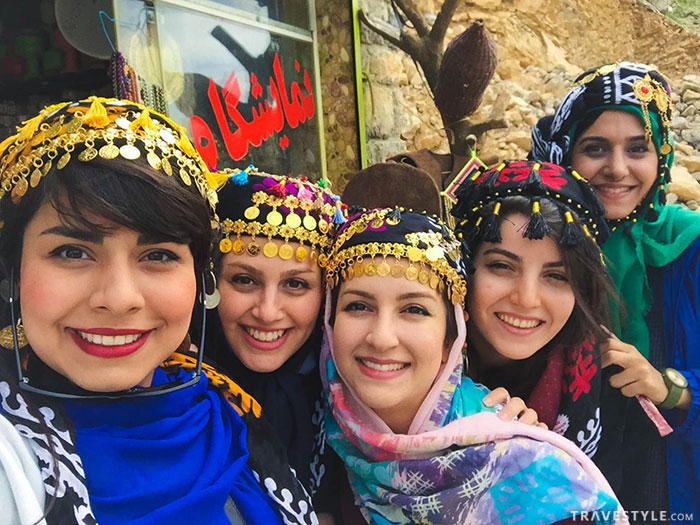
The Kurdish diaspora, dispersed globally, plays a significant role in shaping the international narrative surrounding the Kurds in Iran. Diaspora engagement and international relations are influencing discussions on human rights, cultural recognition, and collaborative initiatives.
Advocacy and Human Rights
Kurdish diaspora communities actively engage in advocacy efforts, drawing attention to human rights issues, cultural preservation, and political reforms. International organizations and governments are increasingly involved in dialogues addressing the concerns of the Kurdish population in Iran.
Cultural Exchange Programs
Cultural exchange programs between the Kurdish diaspora and international institutions foster understanding and collaboration. These programs contribute to the global recognition of Kurdish heritage, opening avenues for academic, artistic, and economic exchanges.
Economic Partnerships
Economic partnerships between the Kurdish diaspora and international businesses or organizations are contributing to the socio-economic development of Kurdish regions. Investments, philanthropic initiatives, and diaspora-driven projects play a role in supporting local communities.
Economic Development Initiatives
Efforts to address socio-economic disparities within Kurdish regions involve targeted economic development initiatives. These endeavors aim to empower local communities, create sustainable livelihoods, and contribute to overall economic resilience.
Infrastructure Investments
Investments in infrastructure, including roads, utilities, and connectivity, are crucial for fostering economic development. Improved infrastructure enhances accessibility, stimulates trade, and provides a foundation for sustainable growth within Kurdish regions.
Local Entrepreneurship
Supporting local entrepreneurship is integral to economic development. Initiatives that provide training, access to capital, and mentorship opportunities empower Kurds to establish and grow businesses, contributing to job creation and community prosperity.
Tourism Promotion for Economic Growth
Recognizing the potential of tourism, there are concerted efforts to promote Kurdish regions as cultural and eco-tourism destinations. Sustainable tourism initiatives not only generate economic opportunities but also showcase the unique cultural and natural assets of Kurdistan.
Educational and Cultural Inclusion
Inclusive educational policies and cultural recognition are essential components of contemporary developments for the Kurds in Iran. Addressing historical disparities and fostering a sense of belonging within the educational system contribute to a more equitable future.
Inclusive Curriculum
Efforts to incorporate Kurdish language, history, and cultural studies into the national curriculum are gaining momentum. Inclusive educational policies aim to celebrate diversity, fostering a more comprehensive understanding of Iran’s rich cultural mosaic.
Cultural Awareness Programs
Cultural awareness programs within educational institutions promote understanding and appreciation for the diversity of Iranian society. These programs encourage students to explore and celebrate the various cultural identities, including Kurdish heritage.
Language Rights
Advocacy for language rights continues to be a focal point. Efforts to ensure the right to education in Kurdish, as well as the preservation of the language in public discourse, are part of the broader movement for cultural inclusion.
Humanitarian and Social Initiatives
Humanitarian and social initiatives are addressing immediate challenges faced by the Kurdish population, ranging from healthcare and education to social well-being and community development.
Healthcare Access
Improving healthcare access within Kurdish regions is a priority. Initiatives such as mobile clinics, awareness campaigns, and health infrastructure improvements contribute to better healthcare outcomes and overall community well-being.
Educational Support
Educational support programs, including scholarships and resource provision, aim to bridge educational disparities. By ensuring access to quality education, these initiatives contribute to empowering the younger generation and building a skilled workforce.
Social Welfare Programs
Social welfare programs address various aspects of community well-being. From poverty alleviation to social inclusion initiatives, these programs enhance the overall quality of life for the Kurdish population.
The contemporary developments within the Kurdish community in Iran reflect a complex interplay of political reforms, cultural revival, international engagement, economic initiatives, educational inclusion, and humanitarian efforts. As these dynamics continue to evolve, the Kurds navigate a path towards greater recognition, inclusion, and equitable participation within the broader Iranian society. The multifaceted strategies employed by various stakeholders, including the government, diaspora, and civil society, contribute to shaping a future where the rich cultural heritage of the Kurds coexists harmoniously with the dynamics of contemporary Iranian society.
The Kurds in Iran, with their rich history, cultural diversity, and resilience, stand as an integral part of the country’s societal mosaic. As discussions on minority rights and political reforms unfold, the Kurds continue to contribute to the vibrant tapestry of Iran, embracing their unique identity while navigating the complexities of the contemporary socio-political landscape. Understanding and acknowledging the role of the Kurds is not only essential for fostering inclusivity within Iran but also for appreciating the rich cultural heritage that they bring to the global stage.

